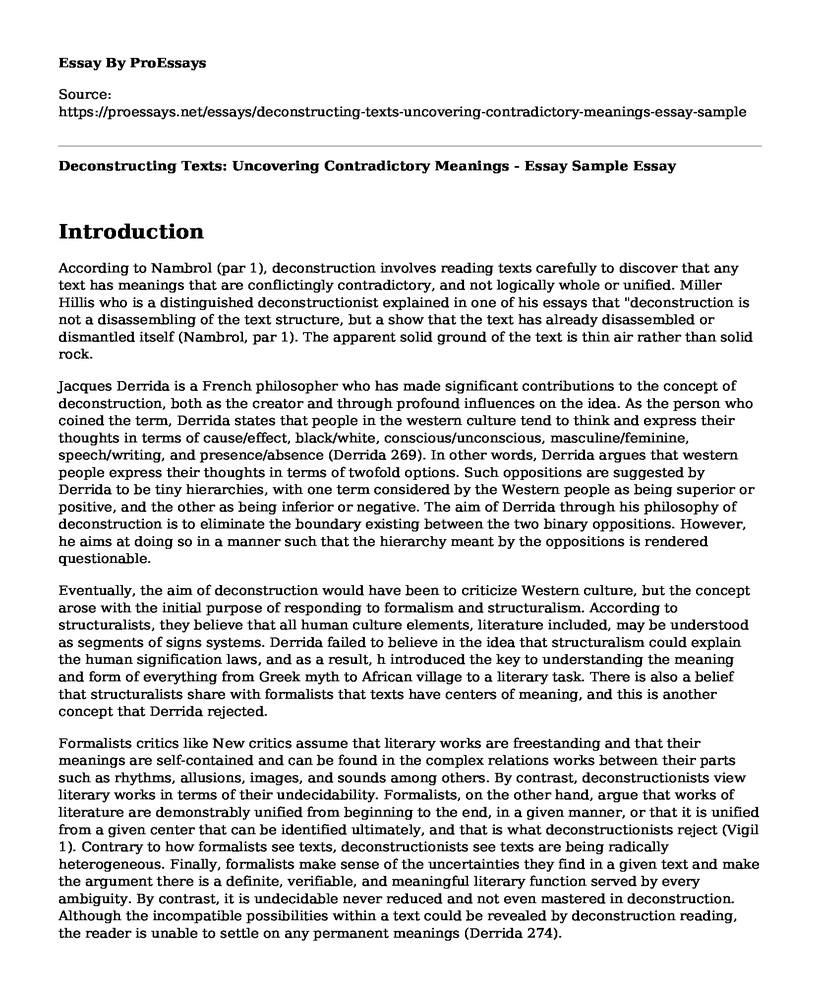Introduction
According to Nambrol (par 1), deconstruction involves reading texts carefully to discover that any text has meanings that are conflictingly contradictory, and not logically whole or unified. Miller Hillis who is a distinguished deconstructionist explained in one of his essays that "deconstruction is not a disassembling of the text structure, but a show that the text has already disassembled or dismantled itself (Nambrol, par 1). The apparent solid ground of the text is thin air rather than solid rock.
Jacques Derrida is a French philosopher who has made significant contributions to the concept of deconstruction, both as the creator and through profound influences on the idea. As the person who coined the term, Derrida states that people in the western culture tend to think and express their thoughts in terms of cause/effect, black/white, conscious/unconscious, masculine/feminine, speech/writing, and presence/absence (Derrida 269). In other words, Derrida argues that western people express their thoughts in terms of twofold options. Such oppositions are suggested by Derrida to be tiny hierarchies, with one term considered by the Western people as being superior or positive, and the other as being inferior or negative. The aim of Derrida through his philosophy of deconstruction is to eliminate the boundary existing between the two binary oppositions. However, he aims at doing so in a manner such that the hierarchy meant by the oppositions is rendered questionable.
Eventually, the aim of deconstruction would have been to criticize Western culture, but the concept arose with the initial purpose of responding to formalism and structuralism. According to structuralists, they believe that all human culture elements, literature included, may be understood as segments of signs systems. Derrida failed to believe in the idea that structuralism could explain the human signification laws, and as a result, h introduced the key to understanding the meaning and form of everything from Greek myth to African village to a literary task. There is also a belief that structuralists share with formalists that texts have centers of meaning, and this is another concept that Derrida rejected.
Formalists critics like New critics assume that literary works are freestanding and that their meanings are self-contained and can be found in the complex relations works between their parts such as rhythms, allusions, images, and sounds among others. By contrast, deconstructionists view literary works in terms of their undecidability. Formalists, on the other hand, argue that works of literature are demonstrably unified from beginning to the end, in a given manner, or that it is unified from a given center that can be identified ultimately, and that is what deconstructionists reject (Vigil 1). Contrary to how formalists see texts, deconstructionists see texts are being radically heterogeneous. Finally, formalists make sense of the uncertainties they find in a given text and make the argument there is a definite, verifiable, and meaningful literary function served by every ambiguity. By contrast, it is undecidable never reduced and not even mastered in deconstruction. Although the incompatible possibilities within a text could be revealed by deconstruction reading, the reader is unable to settle on any permanent meanings (Derrida 274).
Deconstruction is a poststructuralist theory, and it is largely based on Derrida's writings, though not exclusively. In the first instance, it is a philosophical theory and equally directed towards philosophical writings re-reading. Theorists at Yale University are the major mediators that created the influence of the theory in North America. This was based on the fact that the theory sees all writings as being complex cultural and historical processes based on the relationships texts have with each other and in the conventions and institutions of writing. Secondly, it is also based on the intensity and sophistication of its sense that human knowledge is not as convincing or as controllable as Western thought would think that language operates in restraint and often, in ways that are contradictory so that we will always be eluded certainly.
Conclusion
In conclusion, deconstruction is an essential element in literature and equally impressive. Derrida drafted the theory to bridge the gap that people from Western culture have created between the binary objects. Deconstruction looks at the element that makes a text to be whole and the holes existing between the pieces. In simple terms, the theory aims to look at what is said in a text and what is left unsaid in the same text, such that there can never be a text with a single satisfactory meaning. It is like defining an object; for example, a tree, which when defined to an alien with no knowledge on the objects on earth, would become extremely complex explaining since the words such as roots, branches or leaves mean nothing to them.
Works Cited
Derrida, Jacques. "Deconstruction in a nutshell: A conversation with Jacques Derrida." No. 1. Fordham Univ Press, 1997. Retrieved from http://garyrolfe.net/documents/deconstructioninanutshell.pdf
Nambrol, Nasrullah. "Deconstruction." Literary Theory and Criticism, 2016. Retrieved from https://literariness.org/2016/03/22/deconstruction/
Vigil, J. "Deconstructionism in Literature: Definition & Examples." Retrieved May 8 (2018): 2018. Retrieved from https://study.com/academy/lesson/deconstructionism-in-literature-definition-examples-quiz.html
Cite this page
Deconstructing Texts: Uncovering Contradictory Meanings - Essay Sample. (2023, Feb 25). Retrieved from https://proessays.net/essays/deconstructing-texts-uncovering-contradictory-meanings-essay-sample
If you are the original author of this essay and no longer wish to have it published on the ProEssays website, please click below to request its removal:
- "The Tyger" and "The Lamb" Poems Essay
- Models for Ethical Decision-Making Paper Example
- Critical Essay on The State by Tommy Orange
- Analysis of "Fences" by August Wilson
- William Shakespeare's Coriolanus: A Historical Analysis - Research Paper
- Essay Sample on Socrates' Suicide: Plato's Apology & Its Historical Context
- Essay Example on Dracula: Patriarchal Society & Representation of Evil in Female Characters







